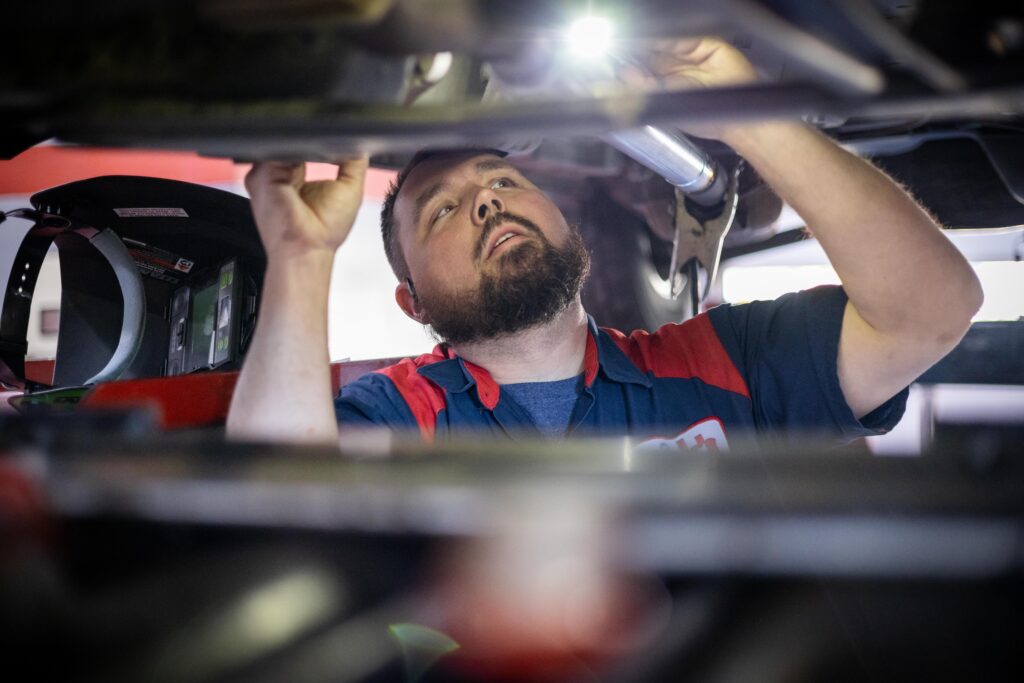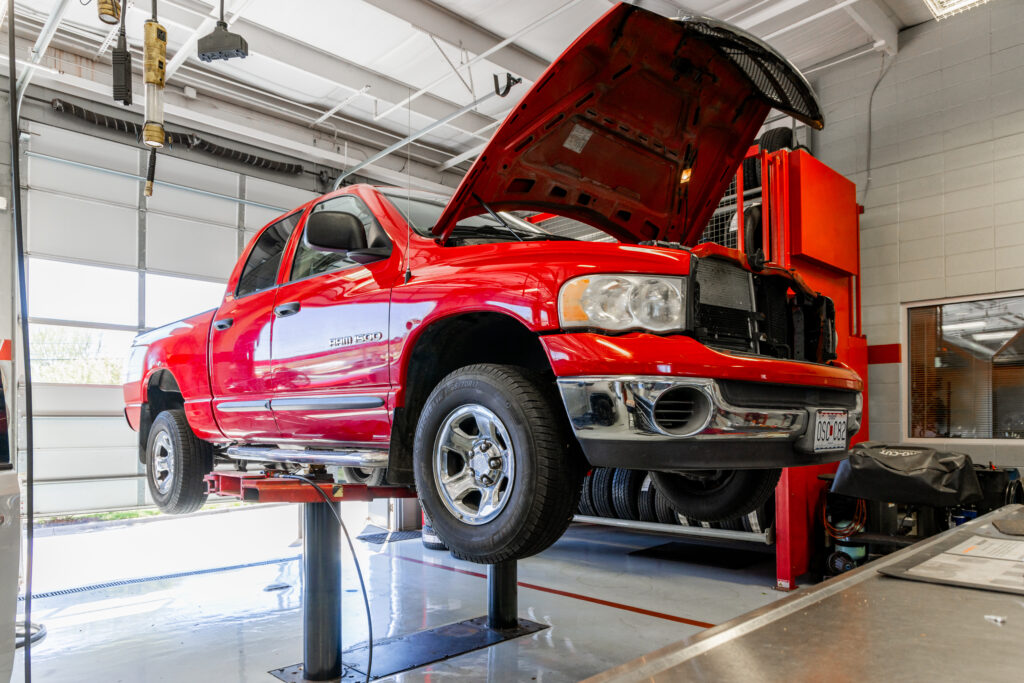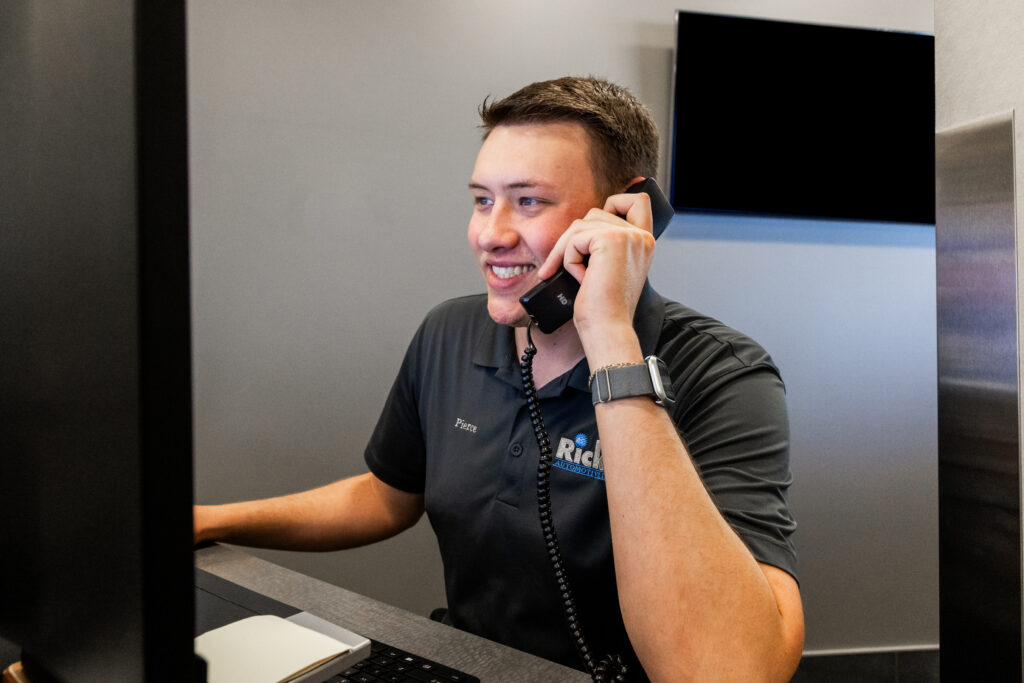It could be any typical weekday morning on autopilot: keys, traffic, drive-thru coffee before the chaos. The reassuring aroma of fresh brew offers a sliver of solace before the world starts making demands.
You’re half a car length away from your cherished morning roast or triple-shot vanilla latte. Suddenly, the engine starts revving up and down on its own, you hear a popping noise, the steering wheel is subtly shaking like it just downed your triple-shot, and the dreaded check engine light pops on!
If these symptoms of a rough idle problem sound familiar, and especially if you stay on top of regular maintenance and it’s happening before you even leave the driveway, it’s not just your car having a morning meltdown—it’s a mechanical red flag.
Rough or shaky idle causes can range from minor maintenance issues to parts that need immediate attention. Let’s explore what might be behind an engine idle problem and how to prevent a bigger repair bill down the road.

Why Your Car Idles Rough: Common Causes & Fixes
There are several mechanical, electrical, or fuel-related issues that can cause a rough or shaky engine idle when your car is stopped. Here are some of the most common:
1. Engine Misfire at Idle
An engine misfire happens when one or more cylinders don’t fire correctly. This can cause your car to visibly shake, hesitate, or run unevenly, especially when it’s idling at a stop. You may also notice a sputtering or popping sound during idle or acceleration.
Common culprits include worn-out spark plugs, weak ignition coils, or fuel issues. Fixing a misfire usually involves diagnosing the exact cause and then replacing the faulty spark plugs, coils, or repairing the fuel delivery system.
2. Vacuum Leak
Engines need a balanced air-fuel mixture to run smoothly. If there’s a vacuum leak, too much air gets pulled into the engine’s intake system. This can lead to rough or uneven idling, unusually high RPMs (which sounds like the engine is revving), or even cause the engine to stall (shut down) at a stop. You may also hear a sputtering or popping noise.
Common causes include cracked vacuum hoses, worn-out gaskets, or leaks in the intake system. A rough idle caused by a vacuum leak is usually a straightforward fix—the damaged parts typically just need to be sealed or replaced.
3. Idle Air Control Valve (IAC) Issues
The IAC valve helps control how your engine idles when you’re not pressing the gas pedal. If it’s dirty or stops working, your car might start idling roughly, stalling, or revving up and down. Cleaning or replacing it will usually smooth things out.
4. Fuel System Problems
If your car idles roughly, hesitates, or feels jerky when you accelerate, the problem could be uneven fuel flow. You may also hear sputtering or coughing sounds coming from the engine.
A dirty fuel filter, failing fuel pump, or clogged fuel injector might be the cause. Fixing the problem usually means cleaning or replacing the fuel injectors, changing the fuel filter, or installing a new fuel pump, if needed.

5. Sensor Failures
Today’s engines depend on various sensors to keep everything running smoothly. If one of them—like the oxygen sensor, mass airflow sensor, or throttle position sensor—starts to fail, it can throw off how your engine runs. You might notice a rough idle or even see the check engine light come on.
The fix usually involves scanning the vehicle for error codes and replacing the faulty sensor to get things back in sync.
Symptoms to Watch For
Here are some telltale signs that your vehicle is experiencing a rough idle or related engine problem:
- Car shakes when idling or you notice engine vibrations at idle
- Fluctuating, elevated, very low, or unstable RPMs
- Engine stalls (stops running) when stopped or while driving slowly
- Car hesitates or jerks when you push on the gas pedal
- Unusual engine sounds, such as sputtering, popping, or coughing
- Check engine light illuminated
Is Your Engine Stalling at Idle? Don’t Ignore It
An engine stalling at idle (or when driving slowly) could be due to several underlying problems. Some issues might be as minor as dirt buildup in the throttle body (the system that controls airflow) while others could be more serious—like internal engine damage that makes it difficult for the engine to generate power, known as compression loss.
In any case, consistent stalling is a sign that your vehicle needs immediate attention to avoid more severe damage or dangerous driving conditions, like stalling in the middle of traffic. Taking action early protects both your engine and your wallet—what might’ve been an inexpensive and easy fix can become a major repair down the road.

Is It Time to Call a Professional?
If you’re noticing symptoms like rough idling, stalling, strange sounds coming from the engine, or unusual vibrations, don’t ignore them. Your car is telling you there’s a problem and it’s time to see a professional. In many cases, when one engine idle issue rears its ugly head, others will follow—these systems are all interconnected.
Trained mechanics have access to diagnostic tools that can read trouble codes and measure sensor output—they know what to look for and how to fix it. Book an engine performance check with the experts at Rick’s Automotive today and keep your drive smooth, safe, and worry-free.
